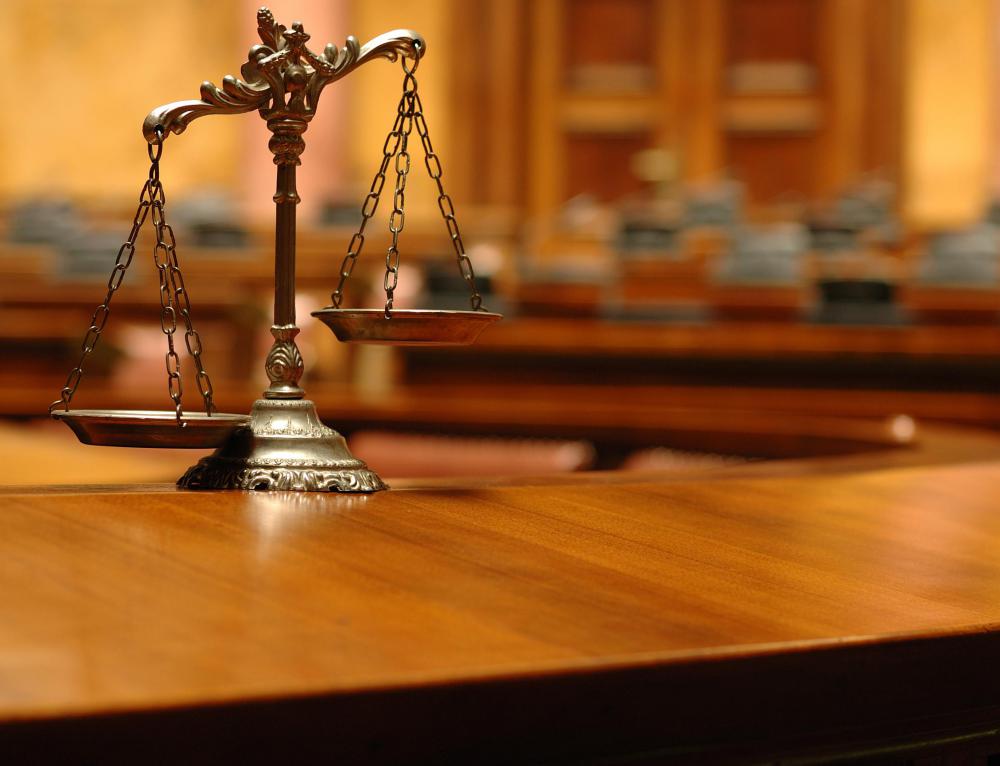At WiseGEEK, we're committed to delivering accurate, trustworthy information. Our expert-authored content is rigorously fact-checked and sourced from credible authorities. Discover how we uphold the highest standards in providing you with reliable knowledge.
What Is the Right to a Fair Trial?
The right to a fair trial is a basic right that is applicable to everyone in the free world by virtue of the fact that under the provisions of universal human rights and under the law, everyone is presumed innocent until they are proclaimed otherwise by a court of competent jurisdiction. A right to a fair trial is recognized and incorporated in most legal systems in the different countries of the world. Apart from its incorporation into local laws, the right to a fair trial has also been enshrined under international law. For example, this right is stated in Article 6 of the European Convention of Human Rights as well as under Article 10 of the Universal Declaration of Human Rights.
A right to a free trial is necessitated by the fact that people have the right to certain expectations regarding any accusations or presumptions against them. Without this provision under the law, people could suffer some persecutions resulting from treating individuals as criminals even when there is no cause for such. Many countries have their own variations of what the right to a free trial should entail, but some of the provisions are applicable in most countries. An example of one of the expectations under the right to a free trial includes the repudiation of arbitrary detention of individuals without any just cause or the indefinite holding of people without informing them of their offense. In most countries, there are specific laws establishing the maximum length of time for which an individual may be held without formal charging and under what circumstances the detention will occur.

Another guarantee under the right to a free trial is the right of individuals to have adequate representation in the form of a lawyer and the right of such people not to say anything that might constitute incriminating evidence without any warning from the police regarding the matter. Most countries also take into cognizance the fact that some of the accused individuals might not have the resources to fully defend themselves in which case the court will be obliged to appoint a legal representative on their behalf. Those people who do not understand the language that is spoken in a country also have the right to have some sort of interpreter who will explain the proceedings as part of the provisions of the right to a fair trial.
AS FEATURED ON:
AS FEATURED ON:











Discussion Comments
It seems to me that a defendant who is actually guilty of the charges can benefit from the "fair trial" mandate. He doesn't have to testify, he doesn't have to answer questions during an interrogation, and he can have affordable counsel assigned to him. Personally, I think this is as fair as a criminal trial needs to be. If the defendant actually committed the crime, the prosecution's case should be solid enough to convince a jury. I can't see how a convicted defendant could claim he or she didn't receive a fair trial, considering all of those rights designed to prevent self-incrimination.
I think the word "fair" is open for interpretation when it comes to trials. The fact that a defendant is sitting in a courtroom surrounded by attorneys is not exactly a point in his or her favor. The assumption is that the defendant must have done something illegal or questionable in order to be sitting in that chair under these conditions. The legal position in most trials is "innocent until proven guilty", but there is also a court of public opinion that views defendants as morally suspect from the start.
What I think is most fair about the jury trial process is that defendants aren't compelled to take the stand in their own defense. The prosecution must meet certain legal standards of proof before the argument of guilt or innocence can be made. If the state doesn't have enough evidence to prove their case beyond a reasonable doubt, the defendant can be found not guilty or the charges could even be dropped.
A defendant isn't obligated to provide testimony which would bolster the prosecutor's case against him. I think that's just about as fair as anything can be in a criminal trial.
Post your comments